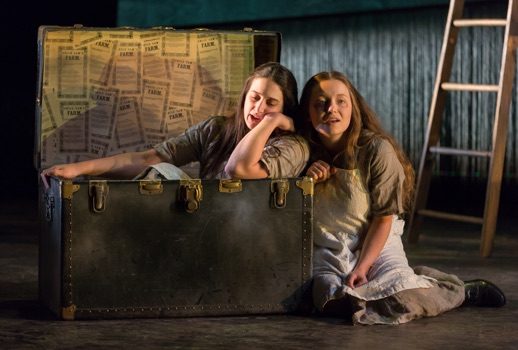
Laura Ingalls, only wilder / Photo: Scott Suchman
There are no fruited plains here. Out of a literal perforation in the horizon of the Nebraskan prairie emerges Proving Up, the most convincing case I have ever seen for modern American opera; the medium has been fitted to our sensibilities, using our sonic mediums and poetically and musically evoking our soundscape, and telling a uniquely American story by two of the most persuasive voices in American new opera.
Missy Mazzoli and Royce Vavrek’s new work, the opening act of Washington National Opera’s “American Opera Initiative Festival” and without a doubt the best thing it’s done all year, is a small marvel.
Vavrek and Mazzoli, the same team responsible for the successful adaptation of Breaking the Waves that premiered in 2016, took inspiration and the work’s title from a short story in Karen Russell’s Vampires in the Lemon Grove. It’s a supernaturally tinged story of homesteaders pitted against their government, struggling to “prove up” (earn the deed to their settled land) in rural Nebraska through the terms of the 1862 Homestead Act.
The Act, a throwback meant to encourage the Jeffersonian (Republican) ideal of Yeoman Farmers, stipulates, among other met quotas, that the settler’s sod house must include one glass window.
It’s a qualification easily enough met for the Zegner family, who possesses the only glass window around, attained through some shady prospecting. But “farmers must look out for farmers,” as the libretto reminds us, and the boozy Johannes Zegner sends his simple son Miles to deliver to window to a neighbor for use when the rumor of the mythical, God-like Government Inspector’s visit begins to circulate.
Tormented all the while by the Shining-esque ghosts of his two deceased sisters, Miles sets off into the elements where he encounters the sinister “Sodbuster” who’s immediately attracted to the window, which is now a symbol for struggle, shattered morals, and exploitation of the land, of each other, and of the pioneers by the government. I won’t spoil the end for you, but the opera really picks up and its conclusion is as far away from Little House on the Prairie as you can get.
With Proving Up, the team has created a piece of unsentimental, thorny Americana, both claustrophobic and agoraphobic in its moods, that defies comparisons to any other genre we’ve use to characterize the “huddled masses.” Instead, it offers a grim “Western Gothic” gloss on the American dream that unfolds slowly over a dense hour and a quarter.
What distinguishes Mazzoli as the foremost American opera composer of the day is her command of writing for the voice. The music isn’t melodic, but she relishes unabashed complex chords, creative orchestral harmonies, and short, succinct, dissonant vocal lines that never quarrel with the libretto. Spoken lines, falsetto singing, and otherworldly straight-tone pepper the vocal score with intrigue.
Though the singers were a clearly carefully selected, if not especially distinguished, cast of WNO’s Domingo-Cafritz Young Artists, it was clear Mazzoli’s music sat comfortably in most of their registers and was uniformly rewarding to sing.
In her orchestration, lead with restraint by Christopher Rountree, Mazzioli draws upon traditional Americana sounds, like harmonicas and guitars, to build a tenuously glistening, dreamy “American Dream” underscoring which, like Royce Vavrek’s carefully-scaled libretto, toggles easily between evoking the expanse of the unforgiving plains and the tenuous angst of domesticity.
But the effect isn’t cinematic in its pejorative sense and over and over again, the vocal lines roil to the top with plaintive desperation. It’s such a clean integration of all of opera’s ingredients and its exposition-heavy first half suggests the piece might even lend itself to more fleshing out into a full-length opera.
The opera was premiered in a spare, intimate production in the Kennedy Center’s newly-renovated Terrace Theater (my dad described it as having a ‘new car smell’) that, had there been no music, might have resembled a performance of Our Town. Alison Moritz provided naturalistic direction that left the enigmatic opera intact enough to be comprehensible but abstract enough so as to provoke thought.
Her cast responded gamely, with standouts being the supple-voiced baritone of Christopher Kenney as Johannes, the spooky Taller and Littler Sisters of Madison Leonard and Allegra De Vita, and the pliant tenor of Arnold Livingston Geis as Miles Zegner. Threatening bass Timothy Bruno’s show-stealing turn as the Sodbuster is downright terrifying.
Sitting in the audience on Friday night, knowing it would be the last opera I’d take in as “Opera Teen,” made me think back to the first performance I ever reviewed, the U.S. premiere of Rufus Wainwright’s Prima Donna in 2012. Recalling my less discerning review of Wainwright’s self-indulgent and sentimental opera, I remember I called the evening an “emotional and interesting operatic experience.” While I may be able to say it better now and tell you why, I think I can say the same thing about Proving Up.



